
Why France's most elaborate and macabre recipe is back on the menu
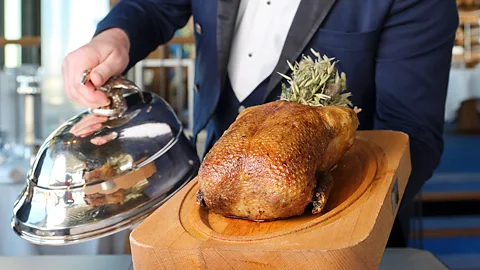
Jodi Hinds
France has more than its fair share of flamboyant dishes – but the most elaborate of all is pressed duck, where a roast duck's bones are crushed to create a decadent "blood sauce".
Follow the loops of the River Seine that winds for 356km from Normandy to Paris, and there are subtle clues that point to the origins of one of French cuisine's most revered dishes, le canard à la presse (pressed duck).
As I stand on the riverside in the sleepy Normandy town of Duclair, set on one of those meandering bends just 20km from my first destination, the city of Rouen, I can see steep white cliffs towering above the waterway that once sheltered ducks who stopped to rest here on their migration south. En route, I passed the huge Christofle factory, the 200-year-old makers of exquisite cutlery and silverware – and the famous silver duck press that is key to the dish's great ceremonial service.
Le canard à la presse is an elaborate and macabre dish that is as much about ceremony as flavour. It involves dramatically crushing the carcass of a part-roasted duck in an ornate silver press that extracts the blood and juices, which are then used to cook the decadent "sauce au sang" (blood sauce) that is made tableside by the maitre d'. The sauce is immediately served with the tender ducks fillets, with the roasted legs brought out after as a second course.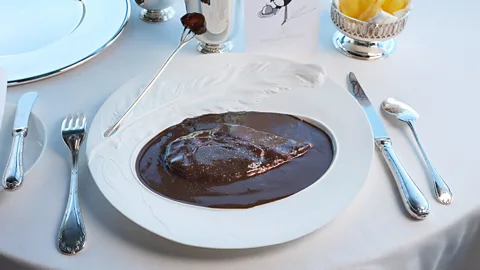
Jodi Hinds
The duck fillet is served with a decadent "blood sauce" that’s made tableside (Credit: Jodi Hinds)
However, for two years, this most decadent of dishes was absent from menus. In 2022 and 2023, avian flu ravaged the supplies of ducks for restaurants across France, but with careful administration of antibiotics, the poultry is now once again safe to serve across France, including in its homeland of Rouen, which was named a Unesco Creative City of Gastronomy in 2021.
Eating this dish is a chance to experience the pomp and ceremony that set classic French cuisine on the global stage in the late 19th Century, and its tableside preparation offers diners a rare glimpse into the fine art of French cooking, which is usually done in the kitchen. It is still served in the some of the nation's most glamorous dining rooms, as well as specialist restaurants, and there are aficionados who travel the world to try it in new places. It even has its own Order of Canardiers, a kind of guild that protects its heritage. Yet its origins are altogether more humble and have much to do with a particularly fat and blood-filled cross-bred duck.
World's Table
BBC.com's World's Table "smashes the kitchen ceiling" by changing the way the world thinks about food, through the past, present and future.
Meanwhile, in Paris, the most famous address to serve it – La Tour d'Argent – on the banks of the Seine, reopened in August 2023 after a two-year renovation, and guests are once again enchanted by the sight of their Premier Maitre de l'Hotel (number one maitre d', to you and me) preparing canard à la presse. The restaurant and its duck press is so revered that, back in 2016, La Tour d'Argent auctioned a 19th-Century press for the staggering sum of €40,000 (they have five other presses for use in the restaurant, including one currently on loan to Paris' Musée de l'Art Decoratifs for their Christofle exhibition, which runs until April 2025).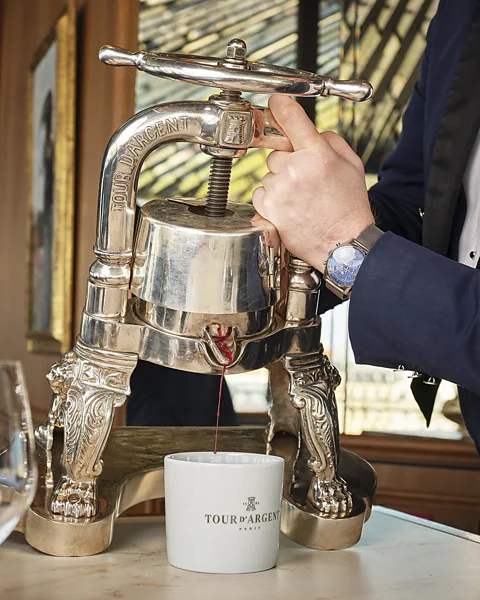
Jodi Hinds
La Tour d'Argent in Paris has five duck presses for use in the restaurant (Credit: Jodi Hinds)
Yet for a dish that has such prestige, like many French dishes, it has its roots in the countryside. When I arrive at Rouen's smart Hotel de Dieppe for a rendezvous with Josette Cheval, a member of the Order of Canardiers, she tells me how it all started.
"The chalky cliffs make the climate slightly warmer along the banks of the River Seine and therefore the ducks migrating would stop to rest, meet the local ducks and," she claps her hands twice, laughing, "clack, clack, some little fat ducklings would then arrive!"
We're chatting in the lounge of the hotel, an important address in the history of the dish. Here, managing director Julien Marchal-Guéret, the grand-nephew of Michel Guéret who established the Order of Canardiers in 1986, joins us and takes up the story. "Everything started in the 17th Century, we think, when these ducks were hunted. This fatter, cross-bred duck [which became known as the Duclair duck] has very tender flesh, it's very red and very tasty," he says. "Hunters would make a meal from the ducks whereby they would put the heart and liver into a small bowl, flambée it with Calvados and make a sauce and then dip the fillets into it. It was a little feast in the forest."
From there, the recipe became a local dish in Duclair and Rouen, and later, in the late 19th Century, it became a speciality of the long-closed Hotel de la Poste in Duclair thanks to its owner Henri "Père" Denise, who bought ducks from the market across the river in the village of Anneville-Ambourville.
"With the wind and the rain of Normandy, the farmers would protect the ducks, perhaps by holding them under their cloaks and they accidentally suffocated," says Marchal-Guéret.
Advertisement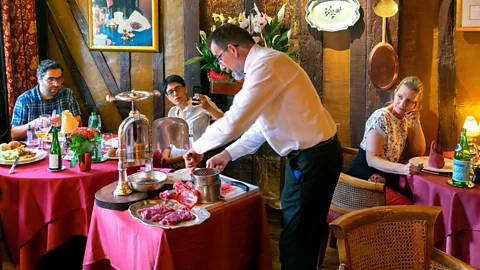
Alamy
The dish's tableside preparation offers diners a rare glimpse into the fine art of French cooking (Credit: Alamy)
As gruesome as it sounds, the fact the ducks' blood remained in the carcass added to the tenderness of the meat, and the story goes that Père Denise was only too happy to take the suffocated ducks for a bargain price. From then on, this was how the ducks were slaughtered.
Marchal-Guéret's family's part in the story came in the 1930s when his great uncle, Michel Guéret, worked as an apprentice aboard the river cruise-liner, the Felix Faure. "He was given carte blanche by the captain one evening to cook for the passengers, and he made the dish, making a few changes such as replacing Calvados with cognac and port." At the Hotel de Dieppe, it is Marachal-Guéret who does the honours of serving the dish in the small dining room in the restaurant Café Victor.
More like this:
• Is the future of French cheese at stake?
• Thunder tea rice: The 2,000-year-old healthy grain bowl
• A restorative soup made for cold season
My own chance to taste the dish at the Café Victor that evening is foiled, however, as Cheval and Marchal-Guéret are both attending the initiation of the new members of the Ordre du Canardier, where 19 new members are due to don their medals, mounted on blue-striped ribbons. There are nearly 200 members for the Rouen chapter of the Order – and "around 3,000 to 3,500 around the world", says Marchal-Guére, proudly, noting that his customers also come from far and wide to taste the dish. "There are fans who come because they want to try all the different variations. And a lot of Parisians just come to Rouen for the day."
For a dish prepared with such ceremony, an impressive dining room is surely a must, and there are few that equal the majesty of La Tour d'Argent, a Parisian restaurant with a 400-year history. When I step into the restaurant's sixth-floor dining room, I can't help but gasp at the heart-soaring view – Notre-Dame Cathedral's spire is newly in situ after the fire and the River Seine parts either side of the Ile de la Cité. Light pours in through the full-height windows and reflects from the mirrored ceiling. Each table is laid with white linen and silver Christofle cutlery, charger plates and goblets.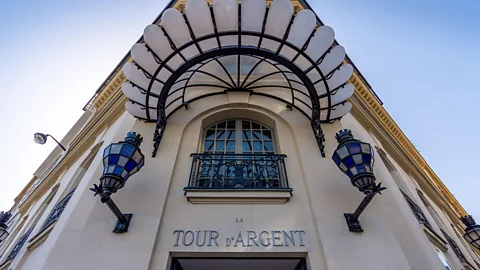
Alamy
La Tour d'Argent is famous for both the theatrical duck dish and its 300,000-bottle wine cellar (Credit: Alamy)
Although La Tour d'Argent's version of the canard à la presse has its roots in Rouen, its importance is due to the restaurant's late-19th-Century owner Frédéric Delair who introduced the dish here and, in so doing, opened another chapter in its story. La Tour d'Argent began as an inn in 1582; later that century it is thought to have been the first place in France that the fork was used – adopted from Italy to save diners dropping food onto their enormous ruffs.
Where Rouen's version of the sauce, la sauce Rouennaise, has elements that are prepared in the kitchen beforehand, the sauce at La Tour d'Argent is prepared entirely in front of the guest. Premier Maitre de l'Hotel Olivier Jacquin is proud to share the process, explaining that it begins tableside with the carving of the roasted duck.
First, he says, the skin is intricately removed with tweezers and then the fillets are sliced from the breast. Next, the duck legs are removed and taken back to the kitchen to be roasted further for the second part of the dish. As I watch, Jacquin places the remaining carcass in the central cavity of the press and turns the wheel, its spout delivering a scarlet drizzle of blood. This is added to the heart and liver in a silver dish atop a silver stove. Next, in goes a glass of the finest cognac and a glass of Madeira wine, and Jacquin whisks it gently over the heat as it thickens – the blood serving as the emulsifier. Then the brown, velvety sauce is gently spooned over the fillets on their silver platter and served to the table alongside the lightest of pommes soufflées (French fried potatoes).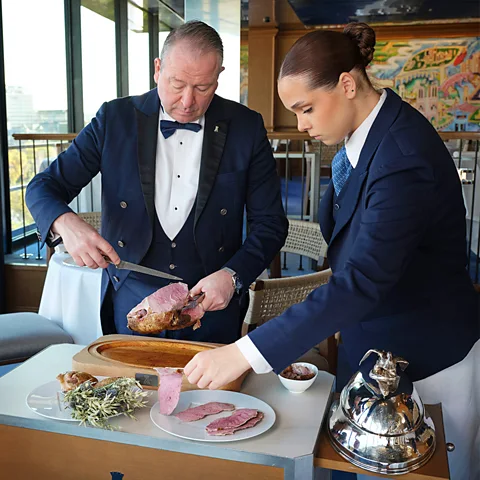
Jodi Hinds
The duck skin is removed with tweezers and the fillets are sliced from the breast (Credit: Jodi Hinds)
When I taste the duck, the fillets are so tender, I barely need to chew; the sauce is velvety smooth and rich with whispering aromas of cognac and Madeira; and the pommes soufflés are the perfect contrast – the light crispy puffed potato pillows crack on my tongue. This part of the dish would easily be rich and filling enough, but there's more to come. The second course is the roasted legs, which are so delicate that the meat falls apart on the fork. I take each bite with a soupçon of the accompanying tarragon-flecked, egg yolk-rich Béarnaise sauce, and I grin with the decadence of it all.
As I finish the meal, I am presented with a certificate: every duck served at La Tour d'Argent since 1890 has a number. Mine is 1,190,337, inscribed on a souvenir postcard, the restaurant's name is embossed in silver with a cartoon duck serving a silver cloche. With my waistline bursting, my gaze returns to the view of the River Seine. I conclude that the dish has had quite the journey through four centuries and along the rivers' loops from Duclair, when it was a hunter's feast in the forest.
--
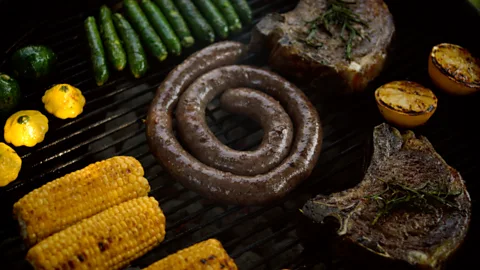
South African Braai: What it is and why you should try it
The Braai tradition in South Africa is more than just a BBQ, it's a phenomenon that ties the nation together.
24 Sep 2024
World's Table
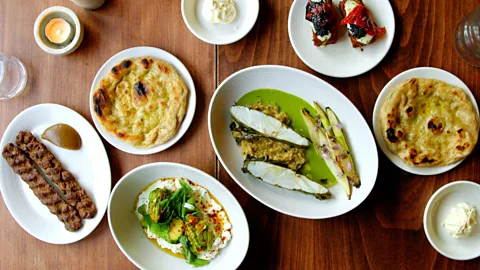
The evolution of London's oldest 'ocakbaşı' restaurant
Mangal 2, a fixture on the London food scene, is redefining Turkish cuisine in a city constantly evolving.
1 Sep 2024
World's Table

Would you eat a meal dreamed up by a computer?
AI v The Mind: We explore the world of food and ask if human expertise is the only way to deliver great flavour.
23 Aug 2024
Innovation

Turkey's wild and rugged Black Sea region
Food writer Nick Kwek finds out how the wild landscape of Turkey's Black Sea region influences local cuisine.
1 Aug 2024
Food & Drink
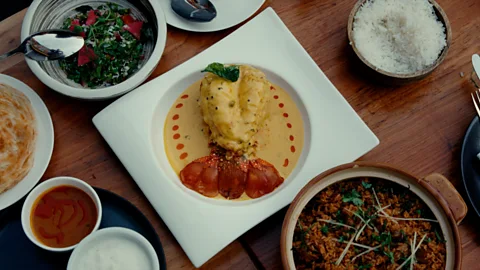
Semma: A rare taste of South India in Manhattan
At Michelin-starred Semma, chef Vijay Kumar brings deeply personal dishes from his childhood to the plate.
6 Jul 2024
World's Table
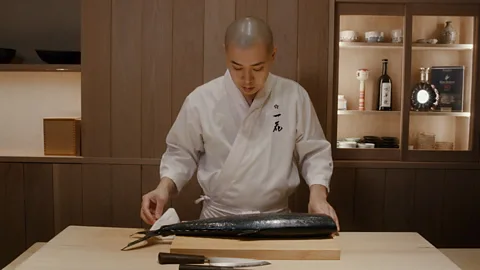
Sushi master brings authentic Japanese techniques to NYC
At Icca, Japanese sushi master chef Kazushige Suzuki blends ancient methods with other cuisines.
8 Jun 2024
World's Table
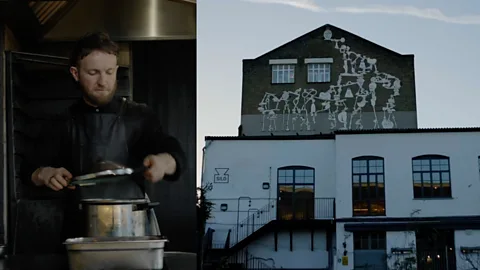
World's first 'zero-waste' restaurant without a single bin
As part of its mission, Silo uses a nose to tail and root to tip approach to cooking out of respect for nature.
22 Apr 2024
World's Table

Sweden's Icehotel: The menu inspired by eight Sami seasons
The menu at the Icehotel, the world's first hotel made out of ice and snow, is served on plates of ice.
14 Apr 2024
World's Table
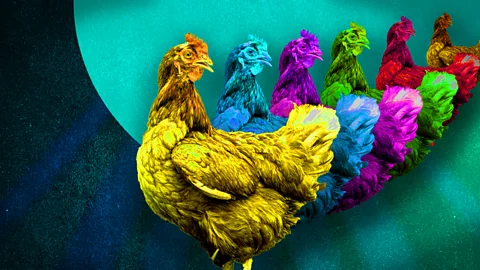
The blunder that changed chickens forever
How this one simple mistake gave birth to the 50-billion-dollar US chicken industry.
25 Mar 2024
Food & Drink
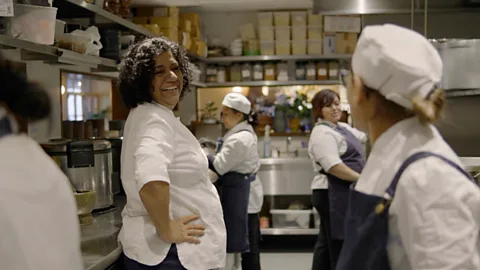
Inside the only all-female Indian kitchen in the world
London's Darjeeling Express is ground zero for chef Asma Khan, a champion of women's empowerment.
9 Mar 2024
World's Table

Into the wild: 'Everyman's right' to forage in Finland
Foraging is one of Finland's favourite hobbies and an essential part of the culture.
4 Mar 2024
World's Table

A unique experience in the heart of a Norwegian fjord
Floating in the middle of a Norwegian fjord, Restaurant Iris takes diners on an 'experiential dining' journey.
17 Feb 2024
World's Table

The mixologist serving up Black History one drink at a time
Deniseea Taylor is a mixologist who teaches what she jokingly calls 'drunk Black History'.
17 Feb 2024
World's Table
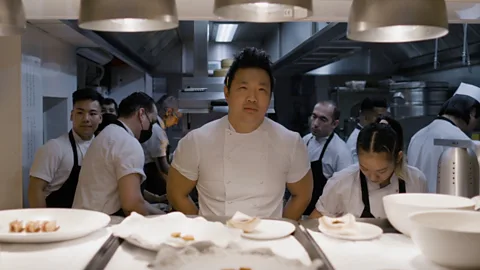
The first two-Michelin-star Chinese restaurant outside Asia
Taste of China: How chef Andrew Wong takes diners on a culinary journey across China's provinces.
10 Feb 2024
World's Table
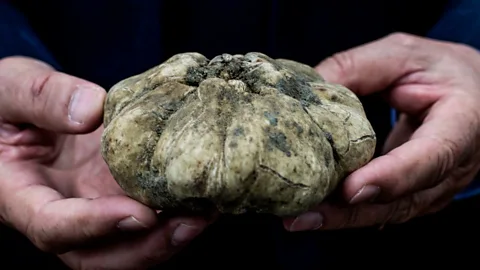
The hunt for the world's most expensive fungus
Reel takes you to Italy to explore how the world's rarest and most expensive ingredient ends up on our tables.
4 Jan 2024
Food & Drink
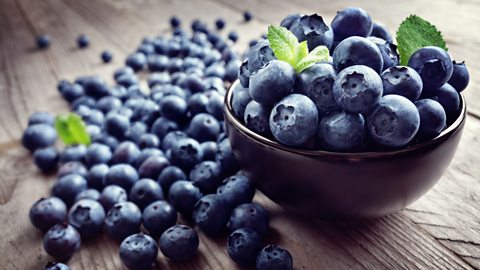
What food and drink is good for your memory?
What we eat, it turns out, can have an impact on how well our memory works.
2 Jan 2024
Food & Drink
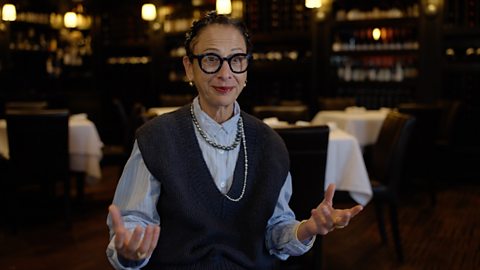
British v American scones: Is there a difference?
American baker and chef Nancy Silverton explains the difference between British and American scones.
24 Dec 2023
World's Table

How safe is frozen fruit?
A huge recall of frozen fruits is currently happening across the US due to contamination fears.
21 Dec 2023
Food & Drink
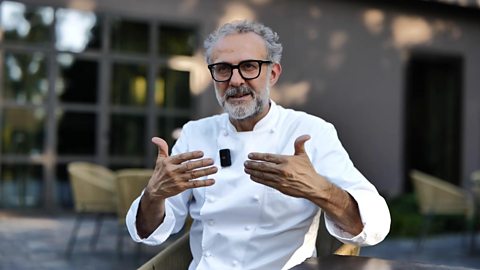
Fire, smoke, and ash are all ingredients in Bottura's BBQ
Inside the kitchen of Italian chef Massimo Bottura's new restaurant Al Gatto Verde.
20 Nov 2023
World's Table
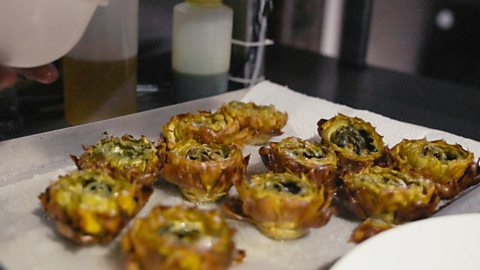
Mastic artichokes: The unique dish of 'Turkey's Tuscany'
Mastic artichokes are a special variety beloved in the Urla region of Turkey.
14 Nov 2023
World's Table
More
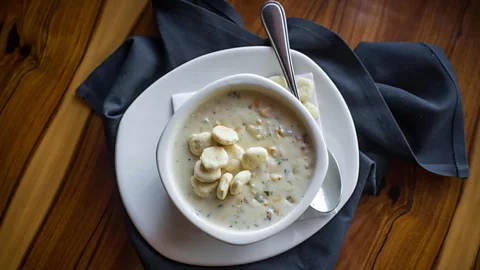
A chef's guide to Boston's best clam chowder
Jeremy Sewall has cooked at eateries around the world, but home in Boston, he's known for his clam chowder. Here are his top local bowls, from Neptune Oyster to Yankee Lobster.
1 day ago
Travel

Do animals grieve for their dead?
Grief has long thought to be a human trait, but other animals – from killer whales to crows – also appear to suffer loss when a companion dies.
1 day ago
Future

A purification ceremony to cleanse body and soul
A purification ceremony in Bali is trending on TikTok. While some locals welcome the interest, others are concerned that their religion is becoming a wellness trend.
2 days ago
Travel

40 of the most exciting books to read in 2025
From the most anticipated literary debuts to the return of heavyweights like Stephen King and Chimamanda Ngozi Adichie, there's plenty to add to your TBR pile this year.
2 days ago
Culture
